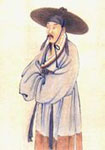“久向林間得佳趣”的意思及全詩出處和翻譯賞析
“久向林間得佳趣”全詩
久向林間得佳趣,不知身外有浮名。
蒲萄雨足初全紫,烏臼霜前已半赬。
欲把一杯終覺嬾,老來懷抱為誰傾?
分類:
作者簡介(陸游)

陸游(1125—1210),字務觀,號放翁。漢族,越州山陰(今浙江紹興)人,南宋著名詩人。少時受家庭愛國思想熏陶,高宗時應禮部試,為秦檜所黜。孝宗時賜進士出身。中年入蜀,投身軍旅生活,官至寶章閣待制。晚年退居家鄉。創作詩歌今存九千多首,內容極為豐富。著有《劍南詩稿》、《渭南文集》、《南唐書》、《老學庵筆記》等。
《秋興》陸游 翻譯、賞析和詩意
《秋興》是宋代文學家陸游創作的一首詩詞。下面是這首詩詞的中文譯文、詩意和賞析:
中文譯文:
秋風又滿會稽城,
有客飄然萬事輕。
久向林間得佳趣,
不知身外有浮名。
蒲萄雨足初全紫,
烏臼霜前已半赬。
欲把一杯終覺嬾,
老來懷抱為誰傾?
詩意:
這首詩描繪了一個秋天的景象,以及詩人對人生和名利的思考。詩人觀察到秋風再次吹滿了會稽城,他自稱有客,輕松自在,將一切世俗的事物都看得很淡。他長期在林間尋找樂趣,卻不知道自己的身外還有一些名利之事。詩中提到蒲萄已經被秋雨浸潤得醬紫,烏臼(一種植物)在霜前已經半霜紅。最后,詩人表達了自己欲舉杯慶祝卻感到疲倦,他懷疑自己的努力和追求是否值得,不知道為了誰而奮斗。
賞析:
《秋興》是陸游晚年創作的一首詩詞,通過對秋天景象的描寫,表達了他對名利和人生意義的思考。詩人借助秋風、蒲萄和烏臼等意象,將自然景物與人生經歷相聯系,揭示了他的內心感受和疑慮。
詩中的“有客飄然萬事輕”表達了詩人已經超脫塵世的心態,他對于名利和俗務已經看得很淡,將一切事物都置于心外。詩人長期在林間尋找樂趣,體驗大自然的美妙,但他也意識到自己可能忽略了一些世俗的名利之事,由此引發了對自己努力和價值的懷疑。
蒲萄和烏臼是秋天的象征,詩中的描繪表現了秋天的美景,同時也暗喻著歲月的流轉和詩人自身的老去。蒲萄被秋雨浸潤得紫紅,烏臼在霜前已經半霜紅,這些形象傳遞出秋天成熟和衰老的寓意。
最后兩句“欲把一杯終覺嬾,老來懷抱為誰傾?”表達了詩人對于自己努力的疲倦和對未來的迷惘。詩人曾經追求名利,但現在感到一種疲倦,他開始懷疑自己所追求的目標是否真正值得,也不知道自己的努力和奮斗最終為了誰而付出。
整首詩詞以秋天的景象為背景,通過對自然景物的描繪,表達了詩人對名利和人生的思考和疑問,展現了一種淡泊寧靜的心態和對于時光流轉的感慨。詩中的意象豐富,語言簡練,給人以深思和共鳴《秋興》 is a poem written by the Song dynasty literary figure, Lu You. Here is the Chinese translation, poetic meaning, and appreciation of the poem:
Chinese Translation:
秋風又滿會稽城,
有客飄然萬事輕。
久向林間得佳趣,
不知身外有浮名。
蒲萄雨足初全紫,
烏臼霜前已半赬。
欲把一杯終覺嬾,
老來懷抱為誰傾?
Poetic Meaning:
The poem depicts an autumn scene and reflects the poet's contemplation on life and fame. The poet observes the autumn wind once again filling the city of Kuaiji. He refers to himself as a visitor who floats lightly, considering everything insignificant. He has long found delight in the woods but is unaware of the external world of fame and reputation. The poem mentions grapes turning purple after being drenched by rain, and the leaves of the plant Wujiao turning reddish before being touched by frost. In the end, the poet expresses his weariness in raising a cup to celebrate, questioning for whom he has strived in his old age.
Appreciation:
"Autumn Excitement" is a poem composed by Lu You in his later years, and it reflects his contemplation on fame, fortune, and the meaning of life through the depiction of an autumn scene. The poet employs imagery such as the autumn wind, grapes, and Wujiao to connect the beauty of nature with his personal experiences, revealing his inner emotions and doubts.
The line "有客飄然萬事輕" (lit. "As a visitor, everything floats lightly") conveys the poet's detachment from worldly affairs. He views fame and fortune lightly, placing everything outside his heart. The poet has long sought pleasure in the woods, experiencing the wonders of nature, but he also realizes that he may have neglected some worldly pursuits, which leads to his doubts about his efforts and their value.
Grapes and Wujiao symbolize autumn in the poem, and their depiction represents the beauty of the season as well as the passage of time and the poet's own aging. The grapes turn purple from being soaked in autumn rain, and Wujiao leaves have already turned reddish before the arrival of frost. These images convey the ripening and aging of autumn.
The last two lines, "欲把一杯終覺嬾,老來懷抱為誰傾?" (lit. "Desiring to raise a cup but feeling lazy, in my old age, for whom do I hold onto my ambitions?") express the poet's weariness in raising a cup to celebrate and his confusion about the future. The poet has pursued fame and fortune in the past but now feels a sense of fatigue. He begins to question whether his pursuits were truly worthwhile and wonders for whom he has exerted his efforts and aspirations.
The entire poem is set against the backdrop of autumn, using the depiction of nature to express the poet's contemplation and questioning of fame, fortune, and the meaning of life. The poem is rich in imagery, concise in language, and evokes deep thoughts and resonance in readers.
“久向林間得佳趣”全詩拼音讀音對照參考
qiū xìng
秋興
qiū fēng yòu mǎn kuài jī chéng, yǒu kè piāo rán wàn shì qīng.
秋風又滿會稽城,有客飄然萬事輕。
jiǔ xiàng lín jiān dé jiā qù, bù zhī shēn wài yǒu fú míng.
久向林間得佳趣,不知身外有浮名。
pú táo yǔ zú chū quán zǐ, wū jiù shuāng qián yǐ bàn chēng.
蒲萄雨足初全紫,烏臼霜前已半赬。
yù bǎ yī bēi zhōng jué lǎn, lǎo lái huái bào wèi shuí qīng?
欲把一杯終覺嬾,老來懷抱為誰傾?
“久向林間得佳趣”平仄韻腳
平仄:仄仄平平平平仄
韻腳:(仄韻) 去聲七遇 * 平仄拼音來自網絡,僅供參考;詩句韻腳有多個的時候,對比全詩即可判斷。